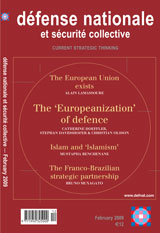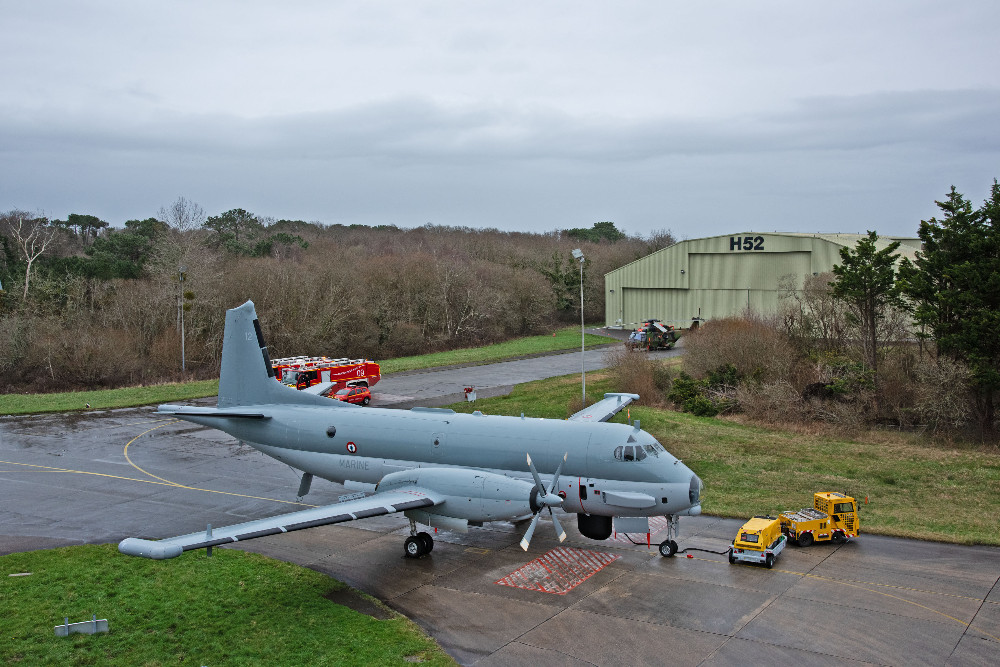Edition anglaise

February 2009 - n° 716
The EU exists: Moscow and Washington have met it - Alain Lamassoure
France’s EU presidency had five priorities, prepared in advance: CSDP, immigration, energy and climate change, the CAP and the Union for the Mediterranean. World events decided otherwise, and the crises in Georgia and the world’s financial system provided the opportunity for Nicolas Sarkozy to make Europe an actor whose voice is listened to. However, the achievements of France’s presidency are likely to be short-lived as long as the Treaty of Lisbon remains non-ratified.
ESDP in the second half of 2008 - Fabien Terpan
The results of European Security and Defence Policy (ESDP) in the second half of 2008 were rather untypical, in that it was France, the driving force behind ESDP, which held the presidency of the Union during this period. While confronting the Georgian crisis, the French EU presidency set out to tackle the issue of crisis management capabilities. In addition, the member states developed collaborative initiatives that could appreciably reinforce ESDP’s potential.
Russian international influence through arms export - Louise-Marie Clouet
The redeployment of Russian arms sales since 2000 illustrates Russia’s renewed presence on every continent, combined with real political voluntarism. But Moscow is faced with structural blockages in its arms industry and the consequent dissatisfaction of its customers. The financial crisis could call a halt to Russian ambitions in the international arms market. If its two privileged levers—arms and energy—disappear, what will remain in Moscow’s diplomatic arsenal to maintain its influence on the international scene?
Security in the Arctic - Hanh-Kieu Florence Nguyen
The melting of the icecap, the most visible sign of global warming, could cause serious problems for collective security. The opening of new navigation routes and access to new resources give rise to considerable strategic upheaval. Whilst Russia has for some time affirmed its wish to invest in the region, the reaction from its neighbours is still awaited. The stakes in the High North are not only environmental but also have a direct impact on the security of the Western world. (Summary of the report ‘The northern dimension of European security’ by the Western European Union/European Security and Defence Assembly, dated 5 November 2008.)
Cooperation and security in ‘Greater Europe’ - Pierre Pascallon, Henri Grossouvre (de)
‘Greater Europe’ exists ‘from the Atlantic to the Urals’. And so it includes ‘European Russia’. The authors of this article argue for an international conference to sort out the present disorder and turbulence on the Old Continent and take into account, with the OSCE, the question of ‘pan-European security’.
European armaments: from cooperation to Europeanization - Catherine Hoeffler
Despite the pro-European declarations of certain countries, defence equipment policies clearly remain the domain of national governments. Convergence or harmonisation among countries is still in many instances difficult to achieve. This article, however, looks at three players that can help the Europeanization of national armaments policies: the European Defence Agency, the European Commission and European defence industrial groups.
Europe's defence dimension and the UN - Stephan Davidshofer, Christian Olsson
In the EU’s declaratory policy, the EU-UN relationship is presented as a ‘natural partnership’, as a part of the ‘added value’ that the EU brings to the UN. However, the reality is more complex. Closer analysis reveals UN rhetoric in ‘European crisis management’, mainly in its military aspects. It would therefore appear that the legitimising of Europe’s defence dimension has in large part benefited from UN impetus in a context where the use of military force was not taken for granted—was even something of a taboo subject—within the architecture of European security. This leads us to question the nature of Europe’s emerging defence dimension.
Islam and ‘Islamism’-a study - Mustapha Benchenane
Islam instituted a continuity, not a breach, with the other monotheistic religions. So ‘Islamism’ cannot justify its war against Jews and Christians, who are also ‘people of the scripture’, on the basis of the Koran. Islam and the majority of Muslims are therefore against Islamism; this is a crisis, not a clash, of civilisations.
The Greco-Turkish dispute over the Aegean Sea: a possible solution? - Didier Ortolland
The evolution of the Law of the Sea, which gives countries new spaces of sovereignty and areas of jurisdiction without specifying their delimitation, is the source of the dispute between Greece and Turkey in the Aegean Sea. This article sets out possible solutions for the delimitation of territorial waters, the continental shelf and exclusive economic zones with reference to the established related jurisprudence and the practice of the states, while taking into consideration the equity and security requirements of both countries.
President Lula's international ambitions and the Franco-Brazilian strategic partnership - Bruno Muxagato
Rediscovering democracy after more than 20 years of military dictatorship (1964-85), Brazil had, until recently, neglected its defence policy. Times have changed, and South America’s giant and natural leader is today seeking to build a modern military instrument, adapted to its own geopolitical ambitions, which can ensure the protection of its natural resources in Amazonia and the Atlantic. Such an aim requires the reconstruction of a defence industrial base and technology transfer in the areas of submarine and aircraft construction, which is the basis of the strategic partnership signed with France in late 2008. The partnership anticipates, in particular, bilateral cooperation in building a Brazilian nuclear attack submarine, the first of its kind in Latin America, and a real instrument of deterrence worthy of a major player on the world stage.
The Military Programme Bill and the New French defence and security policy - Olivier Debouzy, Cécile Fontaine
A wide-ranging reform of French defence has been in hand since 2007. The White Paper on defence and national security adopted in June 2008 included a redefinition of France’s defence and security strategy in line with the new global risks and the creation of armed forces that meet the country’s security needs at affordable cost. The Military Programme Bill adopted by the Council of Ministers on 29 October 2008 and due to come before Parliament shortly is a major step towards implementing the White Paper’s guidelines. In parallel, reform of the organization of the MOD is currently in hand. Taken together, these measures will consolidate and modernise our defence for the coming decades.
The role of the private operator in the protection of critical infrastructure - Clotilde Marchetti
Organising protection of critical infrastructure on a national or European level requires an integrated approach to security planning. It also requires the major network operators to set up operational arrangements to allow them to foresee, avoid if possible, or at least react to any threat that might face them. Where such planning depends on a public-private partnership, the achievement of success supposes that private companies accept that their mission relates more to their nation than to their business world.







